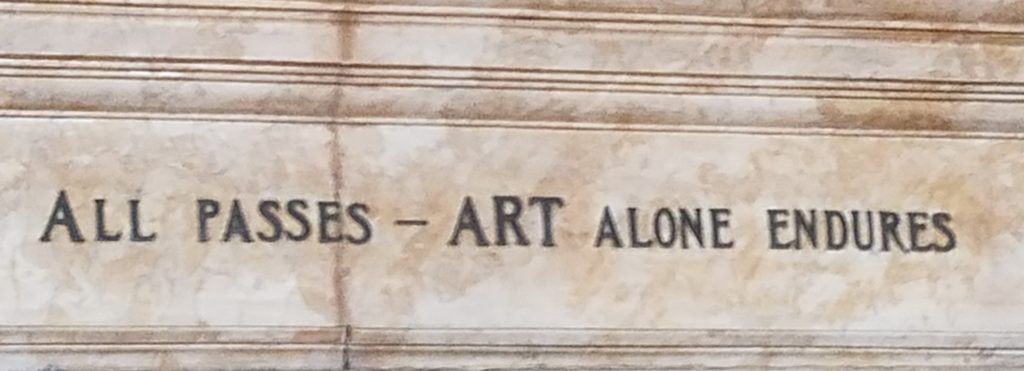“Hope smiles from the threshold of the year to come, whispering, ‘It will be happier.’” Alfred Lord Tennyson
Happy New Year from Choral Ethics! We hope you had a lovely, wonderful Holiday, no matter what you celebrate or didn’t celebrate. We also hope your concerts and services came off without a hitch. Perhaps it all happened without too much drama and trauma, which is a good wish for the holidays.
During the month of January, Choral Ethics is taking its cue from several wonderful quotes of Alfred Lord Tennyson for its unifying theme. Searching around, these popped out at me as a good way to begin the year.
Every New Year, we hope for a better year ahead. Even if the year we are saying “so long” to was a good year, we all hope for better. But what makes for a better year? Does getting a better job with a better salary make it a better year? Or finally making it “official” with your significant other? Or leaving a toxic work environment or relationship? I think it’s a combination of all of those things but also a desire to improve our situation. And becoming more self-aware is a good start.
The more self-aware we are, the better we are able to set ourselves up for success. It is good to take a few steps back and take a more objective look, both professionally and personally. What can you do to objectively set yourself up for a more successful new year? Would trying to become better organized help? Would taking time to “reboot” every evening before you go to bed? What about making a conscious effort to eat better and get more sleep?
In the next few days, try to take an objective look at your situation while the year 2020 is still young. What works in your life? Are you happy with your job situation? Do you want to move on to another area or a nicer apartment or a better job? What are your objective goals? How do you make those things happen? Only YOU can answer those questions and I’m not going to tell you what to do. But I can suggest ways to help get your own answers percolating in your mind. Perhaps we should first acknowledge a few things inherent to our profession.
One thing to acknowledge about our profession is this; things aren’t always easy because of other people. I heard the most perfect way to explain what I mean about “other people” this past December. I was in downtown Chicago for a meeting and decided to stop by one of my favorite music stores. I hadn’t been there for more than a year and couldn’t remember which floor it was on. I stepped onto the elevator with a person carrying a violin case and figured he would know. I asked my question and he told me. Then he asked if I was a musician and I told him yes. He asked me what I play and I told him I am a choral conductor. He replied, “oh, you play politics” and I was floored—what a PERFECT way to put it.
Those other people we need to deal with can be those who administer our choral organization (whether it’s a school administrator, clergy or community chorus board of directors), our singers (students, church choir members, and community chorus singers), other musicians (organist, accompanists and instrumentalists) and our audience (congregation members, parents or paying audience). We must handle them according to the best of our ability to make things work. Quite frankly, I wouldn’t have enough material for my weekly Choral Potpourri/Choral Ethics Blog if things always went smoothly for many of you ChoralNetters! It’s tough to deal with other people issues in addition to the music but we must if we are to succeed. And it’s something for us all to think about these first few days of a new decade.
Next week, we’ll be tackling “kindness,” one of my favorite Choral Ethics topics. Have a lovely week!



Kimberly Guilford says
I know you are working on posts…I have a question…how do you deal with parents that want to tell you how to do your job? I am a veteran teacher (30+ years) that has found that parents want to make comment on the music that is performed at concerts. Just a little frustrated lately.
Marie Grass Amenta says
Hi Kimberly,
Everyone wants to be in charge of the “Jukebox,” no matter the performing ensemble. I’ve dealt with it as a director AND as a parent, listening to other parents tell our kids directors what they should be programming. Many times, I’ve attended the CSO (Chicago Symphony Orchestra) with mumbles around me from other audience members of what they should or shouldn’t be programming. If you follow anyone on Classical Music Twitter, there is SUCH a brouhaha about celebrating–or NOT–Beethoven’s 250 right now and professional ensembles are getting TRASHED because they’ve programmed Beethoven’s 9th later this year. 🙁
So I guess my advise is this–no matter the level of your ensemble, SOMEONE will feel qualified to tell you what your group should be singing and performing. YOU are the professional and I know it’s irritating and frustrating to listen to others telling you what to do. Ignore, ignore, ignore! My Mom used to say “consider the source”–not only do you have to choose the music but you have to rehearse and TEACH the music so your students can PERFORM the music. And those who believe they know what you should be programming have no idea about the part that comes BEFORE the performance. Breath deep and let it slide over you–easier said than done I know–but you don’t have time to let that stuff get to you.